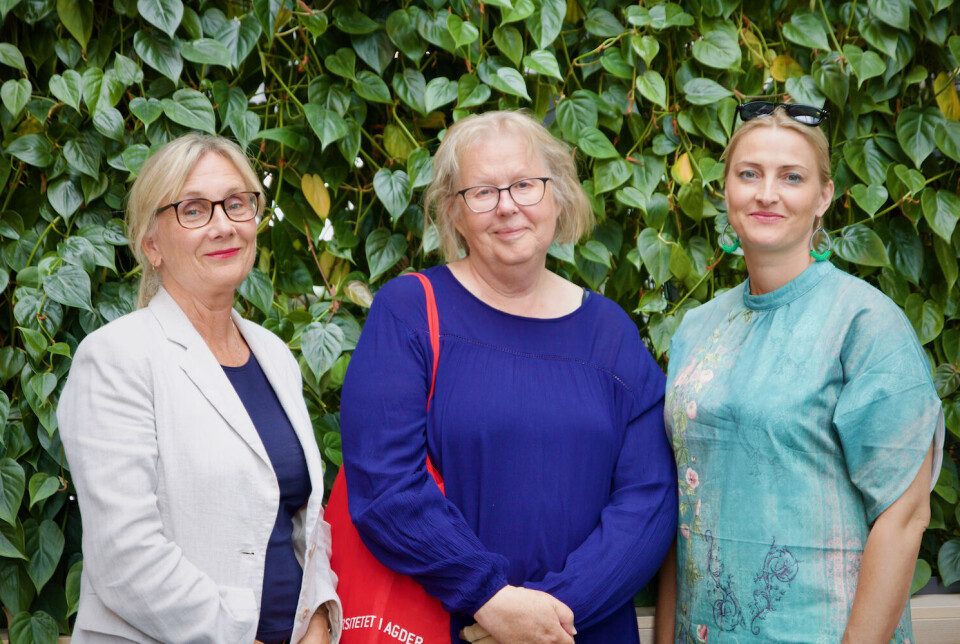THIS CONTENT IS BROUGHT TO YOU BY THE University of Agder - read more

Many teachers would not recommend that their children become teachers
Researchers discuss the loss of meaning for teachers in a new book about everyday life in Scandinavian schools.
Many countries struggle with a shortage of teachers. There are fewer applicants for teacher education courses, and many trained teachers leave the profession.
In Norway, this is something we have noticed over the past two years especially, but it is part of a trend that has been going on for a long time in our neighbouring countries.
Norwegian teacher education has seen a decline in the number of first-choice applicants by 21.9 per cent this year. The number of applicants to teacher education has not been this low since 2008.
In addition, figures from Statistics Norway show that in the fourth quarter of 2020, close to 18,200 primary school teachers had not completed teacher education.
Motivation in the teaching profession
In a new book, a number of researchers go into more detail about the recruitment problems, loss of meaning, and the shaping of meaning in Nordic teacher and pedagogical education courses.
“Making a difference in a child's life is one of the fundamentals of the teaching profession. We are concerned that this aspect is becoming less strong,” Professor Aslaug Kristiansen says.

Together with colleagues from Denmark and Sweden, she is the editor of the book that will be published by the University Press of Southern Denmark in the autumn. The book consists of nine chapters, all of which revolve around meaning and motivation in the teaching profession.
Salary and holidays aren't enough of an incentive
In one of the chapters, which draws on an empirical study, Kristiansen and her colleagues wanted to find out what contributes to the retention of good teachers in schools. They conducted three focus group interviews with a total of twelve teachers who were happy in school. The teachers were at various stages in their careers and came from both urban and rural schools.
“The teachers said they were motivated by being able to make a difference. They wanted to work with children and create a better school than the one they had attended themselves. No one said they became teachers because of the long holiday or the salary,” Assistant Professor Åse Haraldstad says.
As Turid, one of the Norwegian teachers in the book, says:
"You meet so many different people, and you just want to embrace them. They arrive (as) such cute little eighth-graders. Then you’re lucky enough to follow them for three years, and you become very fond of them, and then comes the professional part and you want them to succeed. You find it so incredibly fun to achieve and see that development."
It was often the sense of community with other teachers, the feeling of mastery, and flexibility in the job that contributed most to teachers staying in the job.
“In our conversations with the teachers, we hear that the encounter with other people is what gives them joy,” Associate Professor Kristin Endresen-Maharaj says.
Would not recommend the profession
The researchers found that even though they asked teachers about the positive aspects of the profession, the teachers voluntarily brought up challenges. They mentioned things like:
- Having less time for students
- Waning trust from society
- Lack of flexibility
- Challenging changes in schools
- Concern for colleagues who are struggling
Many of the teachers also said that they were worried about the future of the profession, and that they would not recommend their children to become teachers.
“When even teachers who enjoy their job say this, it's quite serious. What should young teachers who have just started their career think? ” Haraldstad says.
In need of more flexibility
One of the reasons teachers experience less meaning in their profession is that they no longer have time to work well with their students. Instead, they spend more and more of their time reporting and testing.
“We know from other research that students like teachers who do things differently. But all the administration, reporting, and requirements for written reports tie up the teachers' energy. They need freedom and the opportunity to decide for themselves how to work well with their students. Instead, they face high work pressure combined with a lack of influence,” Kristiansen says.
The teachers felt that they had limited influence over their own work, and some felt hesitant to talk about the teaching profession in public.
“It is important to take teachers' voices seriously and encourage them to participate in public debate about schools. Mastery, autonomy, good relationships, and the opportunity to work well with people are key factors for the teaching profession to be meaningful,” she concludes.
Reference:
Bøje et al. 'Professionsuddannelser i krise? Rekrutteringsproblemer, meningstab og meningsdannelse i nordiske lærer- og pædagoguddannelser' (Professional degree programmes in crisis? Recruitment problems, loss of Mmaning, and formation of meaning in Nordic teacher and pedagogical educations), University Press of Southern Denmark, 2023. (Abstract)

This content is paid for and presented by the University of Agder
This content is created by the University of Agder's communication staff, who use this platform to communicate science and share results from research with the public. The University of Agder is one of more than 80 owners of ScienceNorway.no. Read more here.
More content from the University of Agder:
-
Fear being rejected: Half pay for gender-affirming surgery themselves
-
Study: "Young people take Paracetamol and Ibuprofen for anxiety, depression, and physical pain"
-
Research paved the way for better maths courses for multicultural student teachers
-
The law protects the students. What about the teachers?
-
This researcher has helped more economics students pass their maths exams
-
There are many cases of fathers and sons both reaching elite level in football. Why is that?




































